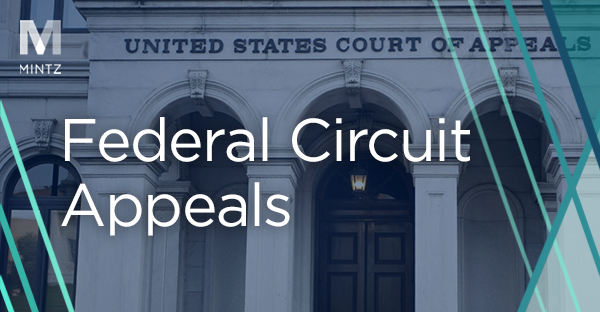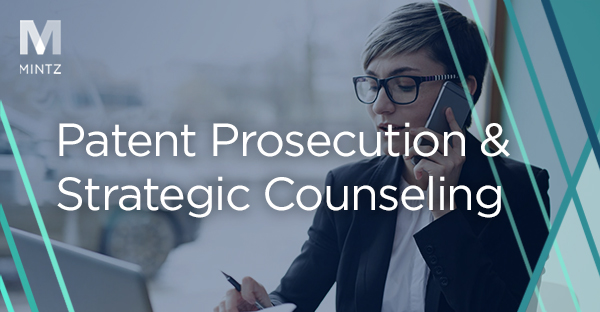
Intellectual Property
Viewpoints
Filter by:
Joinder to the Rescue: Federal Circuit holds that joinder of instituted IPRs does not result in estoppel under § 315(e)
October 6, 2020 | Blog | By Peter Cuomo
In Network-1 Techs., Inc. v. Hewlett-Packard, No. 18-2338, the Federal Circuit reversed and vacated multiple aspects of the district court’s final judgment holding that Hewlett-Packard (HP) did not infringe U.S. Patent No. 6,218,930 (“the ’930 patent”) disclosing an apparatus and method for remotely powering Ethernet compatible equipment.
Read more
Another One Bites the Dust – N.D. Tex. Dismisses Antitrust Claims re FRAND Commitments with Prejudice
September 17, 2020 | Blog | By Michael Renaud
In the latest decision addressing antitrust liability for FRAND commitments, Judge Barbara M. G. Lynn of the Northern District of Texas dismissed a complaint from Continental Automotive Systems, Inc. (“Continental”) alleging, inter alia, violations of §§ 1 and 2 of the Sherman Act, and declaratory judgment as to FRAND obligations against Avanci, LLC (“Avanci”) and various members of its patent pool (collectively, “Defendants”).
Read more
Fact-Specific Inquiry: Deciding Between Trade Secret and Patent Protection
September 15, 2020 | Blog | By Adam Samansky, Nicholas Armington
Innovations that are eligible for patent protection are often vital to a company’s revenue stream and profitability, but in some cases, opting for trade secret protection is a better strategic choice.
Read more
DOJ to IEEE: Yes, Injunctive Relief Should Be Available for SEPs, and Stop Saying Otherwise
September 14, 2020 | Blog | By Michael Renaud, James Wodarski, Daniel Weinger
Last Thursday, September 10, 2020, the U.S. Department of Justice’s Antitrust Division (“DOJ”) issued an updated Business Review Letter (“2020 Letter”) to the Institute of Electrical Electronics Engineers, Incorporated (“IEEE”) clarifying the DOJ’s views on licensing and enforcement practices related to standard essential patents (“SEPs”).
Read more
Patent Application Declarations for Unavailable or Uncooperative Inventors
September 14, 2020 | Blog | By Christina Sperry, Mark Hammond
Increased employee mobility, health challenges, and the economic downturn due to the COVID-19 pandemic may result in more inventors than usual being unavailable to sign declarations for patent applications as required by the U.S. Patent and Trademark Office (USPTO) for all applications.
Read more
Rules of Engagement: Minimizing Trade Secret Disputes when Hiring Rival Employees
September 10, 2020 | Blog | By Adam Samansky, Nicholas Armington
An ethical corporate culture and clear expectations during the hiring process can help companies curtail trade secret disputes when hiring employees from rival companies.
Read more
Playing Fair: Protect Trade Secrets from Business Partners
September 8, 2020 | Blog | By Adam Samansky, Nicholas Armington
Companies can minimize trade secret theft by business partners by instituting non-disclosure agreements before sharing trade secrets and establishing general confidentiality agreements with business partners.
Read more
USPTO Weighs in on IT Modernization in CXOTalk Interview
August 31, 2020 | Blog | By Christina Sperry
How does an important U.S. government agency modernize its operations, especially during a global health crisis? What IT modernization approach can U.S. patent and trademark practitioners expect from the United States Patent and Trademark Office (USPTO)?
Read more
THE SEP WORLD IN BALANCE: UK Harmonizes with Germany’s Rejection of Implementer Hold Out
August 26, 2020 | Blog | By Michael Renaud, James Wodarski, Daniel Weinger, Matthew Galica
Another major development in global standard essential patent litigation was handed down today, as the UK Supreme Court upheld lower court rulings that forced an efficient infringer of essential patents to accept a global license or face an injunction.
Read more
Workplace Confidential: Preventing Former Employees from Using Your Trade Secrets
August 24, 2020 | Blog | By Adam Samansky, Nicholas Armington
By proactively protecting trade secrets and using litigation strategically, companies can minimize trade secret misappropriation by former employees.
Read more
Danger on the Horizon: Detecting Early Signs of Trade Secret Theft by Competitors
August 20, 2020 | Blog | By Adam Samansky, Nicholas Armington
Companies can quickly detect trade secret theft by planting an unneeded feature or part that would be included in a copycat item and continually monitoring competitors’ new products.
Read more
Keeping (Trade) Secrets Amid a Reduction in Force
August 17, 2020 | Blog | By Adam Samansky, Nicholas Armington
Companies can lower the risk of trade secret theft amid a reduction in force by limiting and auditing the use of trade secrets and including confidentiality provisions in severance agreements.
Read more
Ninth Circuit Reverses FTC Win in FTC v. Qualcomm, Finding No Antitrust Violations from Qualcomm’s Licensing of its Standard-Essential Patents
August 13, 2020 | Blog | By Rich Gervase, Michael Renaud, Tinny Song
In a reversal that came as no surprise to many observers, on Tuesday, August 11, 2020, a unanimous panel of the U.S. Court of Appeals for the Ninth Circuit reversed the decision by the U.S. District Court for the Northern District of California in FTC v. Qualcomm and vacated the district court’s worldwide, permanent injunction prohibiting several of Qualcomm Incorporated’s (“Qualcomm”) licensing practices with respect to standard-essential patents (“SEPs”) covering cellular technology.
Read more
District of Delaware Goes against Prior Decisions and Declines to Dismiss Willful Infringement Claims Despite Failure to Allege Egregious Infringing Conduct
August 12, 2020 | Blog | By Adam Samansky, Peter Cuomo, Joe Rutkowski
On July 30, 2020, the U.S. District Court for the District of Delaware, in APS Technology, Inc. v. Vertex Downhole, Inc. et al, No. 19-cv-01166, denied Vertex Downhole’s Rule 12(b)(6) motion to dismiss APS’s patent infringement complaint.
Read more
Federal Circuit Reminds PTAB That Short Cuts Are Not Allowed
August 11, 2020 | Blog | By Brad M Scheller
Last month, in a precedential decision, the Federal Circuit vacated-in-part and remanded the Patent Trial and Appeal Board’s (“Board”) obviousness determination regarding Alacritech’s computer networking patent because the Board failed to adequately explain its findings for three of the challenged claims.
Read more
Sort It Out: Cell Sorting Method with Data Processing Steps Patent Eligible
August 11, 2020 | Blog | By Brad M Scheller
In XY, LLC v. Trans Ova Genetics, LC (Case 2019-1789, issued July 31, 2020), the Federal Circuit provided another example of a life sciences method claim avoiding patent ineligibility under the Alice framework at step one, altogether avoiding the “inventive concept” analysis under step two.
Read more
The Standard Does Rule Them All: Federal Circuit Panel Finds Standard Sufficient to Prove Infringement for SEP Compliant Products
August 5, 2020 | Blog | By Michael Renaud, James Wodarski, Daniel Weinger
The Federal Circuit yesterday, in a decision likely to be celebrated by holders of standard essential patents (“SEPs”), found that it is appropriate for the jury to decide essentiality of a patent, rather than the judge during claim construction. This decision in Godo Kaisha IP Bridge I v. TCL Commc’n Tech. Holdings Ltd. also approved of the use of the standard as evidence of infringement where it was established that the accused products are standard compliant.
Read more
Eastern District of Michigan Dismisses Willful Infringement Claims for Failure to Allege Infringer's Knowledge and Egregious Conduct, Joining Majority Views on Pleading Requirements
August 4, 2020 | Blog | By Adam Samansky, Peter Cuomo, Joe Rutkowski
On July 13, 2020, the U.S. District Court for the Eastern District of Michigan, in Mich. Motor Techs., v. Volkswagen Aktiengesellschaft, No. 19-10485, granted Volkswagen’s motion to dismiss Michigan Motor Technologies’ (MMT’s) willful infringement claims and request for enhanced damages under 35 U.S.C. § 284 because MMT failed to allege sufficient facts to plausibly establish that Volkswagen acted egregiously and with knowledge of both the asserted patents and Volkswagen’s infringement thereof.
Read more
“Anything Goes” – Federal Circuit Says PTAB Can Use Any Means to Knock Out Substitute Claims (Uniloc v. Hulu: Part 2)
July 29, 2020 | Blog | By Brad M Scheller
Yesterday we discussed the Federal Circuit’s decision in Uniloc 2017 LLC v. Hulu, LLC confirming the Board’s authority to review contingent substitute claims after the original claims have been held invalid by a federal court. Today we cover the panel’s ruling that the Board can use any patentability requirement to evaluate and reject proposed substitute claims in an IPR, notwithstanding that originally-petitioned claims in such proceedings can only be challenged under §§ 102 and 103 based on prior patents and printed publications.
Read more
Fractured Federal Circuit Panel Finds That Sovereign Immunity Does Not Prevent Exclusive Licensee from Pursuing Unlicensed Infringement Alone
July 28, 2020 | Blog | By Andrew DeVoogd, Daniel Weinger
Entities with patent-related relationships with state universities scored a victory under the rarely implicated (at least for patent practitioners) doctrine of sovereign immunity. For patent holders, sovereign immunity comes into play when a state actor, for example a state university, enters contracts related to patents, such as in Gensetix v. Baylor College of Medicine.
Read more
Explore Other Viewpoints:
- Data Centers & Digital Infrastructure
- AI: The Washington Report
- Antitrust and Federal Regulation
- Appellate
- Arbitration, Mediation & Alternate Dispute Resolution
- Artificial Intelligence
- Awards
- Bankruptcy & Restructuring
- California Land Use
- Cannabis
- Class Action
- Complex Commercial Litigation
- Construction
- Consumer Product Safety
- Corporate Governance (ESG)
- Cross-Border Asset Recovery
- DEI Legal Developments
- Debt Financing
- Direct Investing (M&A)
- Diversity
- EB-5 Financing
- Education & Nonprofits
- Employment
- EnforceMintz
- Environmental (ESG)
- Environmental Enforcement Defense
- Environmental Law
- Environmental, Social, and Corporate Governance (ESG)
- FDA Regulatory
- FDA in Flux
- False Claims Act
- Federal Circuit Appeals
- Financial Institution Litigation
- Government Law
- Growth Equity
- Health Care
- Health Care Compliance, Fraud and Abuse, & Regulatory Counseling
- Health Care Enforcement & Investigations
- Health Care Transactions
- Health Information Privacy & Security
- IP Due Diligence
- IPRs & Other Post Grant Proceedings
- Immigration
- Impacts of a New US Administration
- Insolvency & Creditor Rights Litigation
- Institutional Investor Class Action Recovery
- Insurance & Financial Services
- Insurance Consulting & Risk Management
- Insurance and Reinsurance Problem-Solving & Dispute Resolution
- Intellectual Property
- Investment Funds
- Israel
- Licensing & Technology Transactions
- Life Sciences
- Litigation & Investigations
- M&A Litigation
- ML Strategies
- Managed Care
- Medicare, Medicaid and Commercial Coverage & Reimbursement
- Mergers & Acquisitions
- Patent Litigation
- Patent Prosecution & Strategic Counseling
- Pharmacy Benefits and PBM Contracting
- Portfolio Companies
- Privacy & Cybersecurity
- Private Client
- Private Equity
- Pro Bono
- Probate & Fiduciary Litigation
- Products Liability & Complex Tort
- Projects & Infrastructure
- Public Finance
- Real Estate Litigation
- Real Estate Transactions
- Real Estate, Construction & Infrastructure
- Retail & Consumer Products
- Securities & Capital Markets
- Securities Litigation
- Social (ESG)
- Special Purpose Acquisition Company (SPACs)
- Sports & Entertainment
- State Attorneys General
- Strategic IP Monetization & Licensing
- Sustainable Energy & Infrastructure
- Tax
- Technology
- Technology, Communications & Media
- Technology, Communications & Media Litigation
- Trade Secrets
- Trademark & Copyright
- Trademark Litigation
- Unified Patent Court (UPC)
- Value-Based Care
- Venture Capital & Emerging Companies
- White Collar Defense & Government Investigations
- Women's Health and Technology










